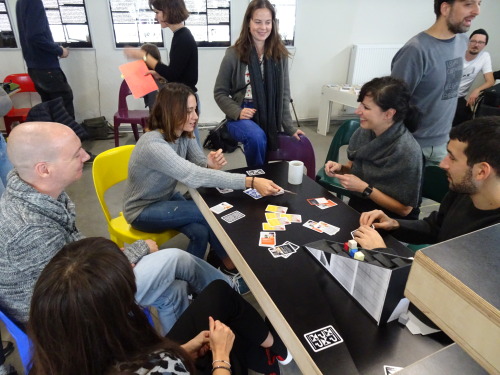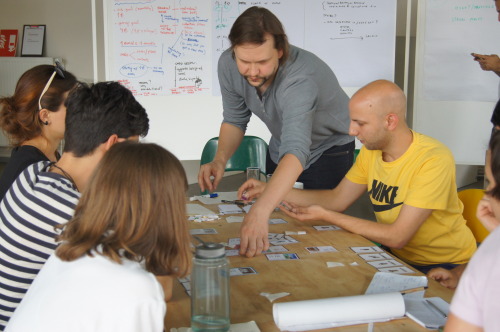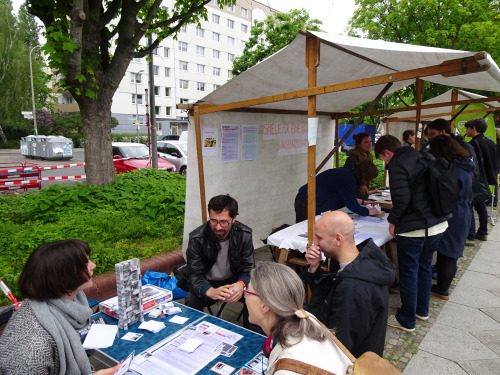Our Stadtlabor for multimodal anthropology‘s explorations around urban games feature at the exhibition „Open Form neu Denken“ organized by Z/KU at the Werkstatt of Haus der Statistik.

When? October 25–27 2019
Where? Werkstatt Haus der Statistik – Karl-Marx-Allee 1, 10178 Berlin
Come by and play with us!
Events
Friday, 25.10.2019: Opening
Saturday, 26.10.2019: Conference
A conference in the exhibition will be focusing on the concept of open form and how it travels between design, architecture, politics and anthropology. Ignacio Farías and Tomás Criado will give a short input on games as a form of urban research.
Sunday, 27.10.2019: Playing
The Stadtlabor team that worked on the games will be hosting the exhibition and playing and explaining the games to the visitors

More information (German & English)
DE | Spiele als Stadtforschung
Als Stadtlabor entwickeln wir konzeptuelle, spekulative und materielle Werkzeuge, wie etwa Spiele, um auf die aktuellen Krisen des modernen Urbanismus zu reagieren. Trotz oder gerade aufgrund ihrer spielerischen Dimension befähigen uns Spiele, die Art und Weise zu verändern wie wir Themen in Frage stellen, Wissen teilen, Bewusstsein schaffen, kritische Öffentlichkeiten generieren, Zukünfte imaginieren und Fürsorge erlernen.
Die von uns entwickelten Spiele sind keine finalen Produkte, sondern offene Prototypen. Sie sind Ergebnis und Methode unserer Forschung und Werkzeug, um Stadtentwicklungsprozesse gemeinsam zu gestalten. Als solche sind sie offen für Veränderung und Versionierung, damit ihre spezifischen Sprachen, Logiken, Spielweisen und Effekte an spezifische Situationen und unterschiedliche städtische Akteure angepasst werden können.
Unsere Explorationen rund um Spiele begannen im Kontext eines einjährigen ethnographischen MA-Studierendenprojekts The Only Game in Town?, das die aktuelle Krise des Berliner Wohnraums und Immobilienmarkts analysierte. Inspiriert von der Geschichte des Spiels Monopoly – registriert im Jahr 1904 von Elizabeth Magie als The Landlord’s Game und konzipiert als pädagogisches und politisches Instrument, um über die Gefahren von Landmonopolen aufzuklären – haben wir uns vorgenommen, Spielprototypen zu entwickeln, um unsere Forschungsergebnisse zu teilen.
In Zusammenarbeit mit dem ZK/U haben wir drei Spiele entwickelt: (1) House of Gossip problematisiert die drohende Verdrängung von Mieter*innen aus ihrem Wohnraum; (2) in Sue Them All setzt sich ein Kollektiv für gerechte Wohnpolitik ein; und (3) das Kiez Mind Archive schafft einen performativen Raum der Wissensproduktion. In diesem Prozess stellten wir fest, dass die Auseinandersetzung mit Spielen auch unseren Bezug zur Wissensproduktion verändert: vom Beschreiben zum Eingreifen, von Repräsentation zur Konstruktion von Wirklichkeiten, und damit auch zu einem Experimentieren mit der Bedeutung von Politik und Kritik bei der Entwicklung und Nutzung von Spielen.
EN | Games as urban research
In the Stadtlabor for multimodal anthropology, we are developing conceptual, speculative and material tools, such as games, to respond to the current crises of modern urbanism. In spite, or even because of their ludic dimension, games are capable to alter the ways in which we discuss issues, share knowledge, raise awareness, make urban problems public, imagine futures, and learn to care.
The games we have developed are not final products but open prototypes. They are result and method of our research, and work as devices to intervene in urban development processes. As such, they are open to be transformed and re-versioned, so that their specific languages, logics, gameplay, and effects could be adapted to specific situations and concerns of various urban actors.
Our exploration around games started in the context of a one-year ethnographic MA student project The Only Game in Town? analysing the contemporary crisis of housing and real estate markets in Berlin. Inspired by the history of the game Monopoly–registered in 1904 by Elizabeth Magie as The Landlord’s Game and conceived as an educational and political tool to reveal the dangers of land monopolies–, we then set to prototype games as a means to share our research results. In collaboration with ZK/U, we have produced three games: (1) House of Gossip problematizes the threat of displacement of tenants from their homes; (2) in Sue Them All a collective advocates for fair housing policy; and (3) the Kiez Mind Archive creates a performative space of knowledge production. In the process, we discovered that developing games also impacts how we could do research: from describing to intervening, from representing to performing (and breaching) reality, thus experimenting with what politics and critique might mean whenever we prototype and play.



Games: Open Documentation
House of Gossip

Sue Them All

Kiez Mind Archive
Stadtlabor for Multimodal Anthropology

DE | Das Stadtlabor for Multimodal Anthropology ist eine Forschungsplattform, in der Anthropolog*innen, die an aktuellen Stadtthemen interessiert sind, multimediale Formate der Wissensproduktion und -intervention in Zusammenarbeit mit städtischen Akteuren erkunden und wird vom Lehrstuhl für Stadtanthropologie der Humboldt Universität zu Berlin geführt. Mitglieder, die an der Entwicklung der Spiele beteiligt waren, sind: Diana Mammana, Tan Weigand, Lilian Krischer, Lena Heiss, Leonie Schipke, Indrawan Prabaharyaka, Marie Aline Klinger, Tomás Sánchez Criado und Ignacio Farías.
EN | The Stadtlabor for Multimodal Anthropology is a research platform, where anthropologists interested in contemporary urban issues explore multimedia formats of knowledge production and intervention in collaboration with other urban actors and is run by the Chair of Urban Anthropology at Humboldt University of Berlin. The members who participated in the development of these games are: Diana Mammana, Tan Weigand, Lilian Krischer, Lena Heiss, Leonie Schipke, Indrawan Prabaharyaka, Marie Aline Klinger, Tomás Sánchez Criado and Ignacio Farías.
**
Texts adapted and expanded from the official invitation & the documentation of the exhibition
One reply on “Spiele als Stadtforschung / Games as urban research”
[…] Fecha. Miércoles 27 de noviembre, 17.30. Lugar. Seminario del Área de Antropología, Departamento de Antropología Social y Psicología Social. Más información: #Anthropologycon: https://anthropologycon.org/ Cards Against Anthropology: https://www.anthropologygames.com/cards-against-anthropology Stadtlabor for multimodal anthropology: https://tscriado.org/2019/10/21/spielealsstadtforschung/ […]